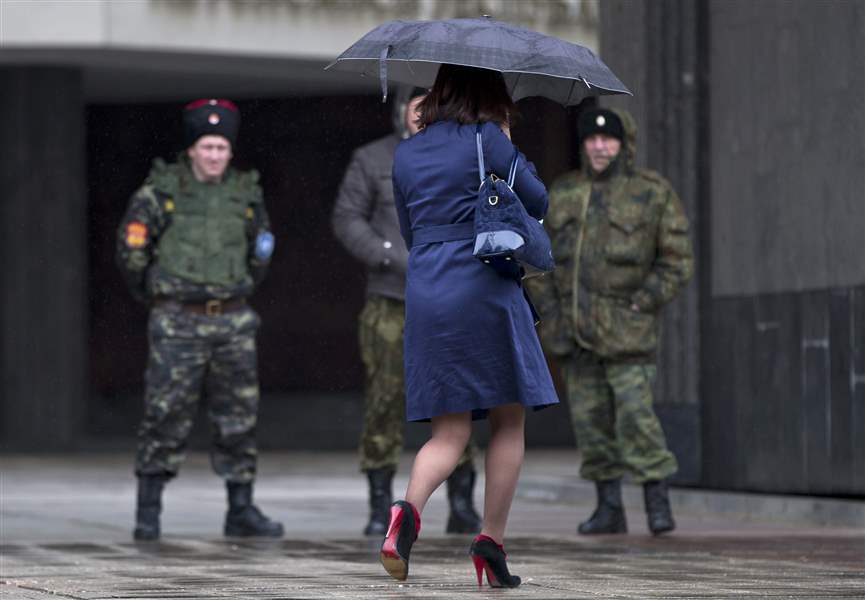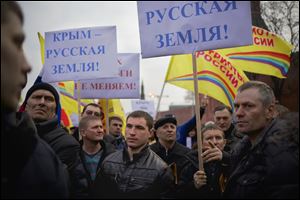
Parliamentary speaker: Russia would welcome Crimea
65,000 demonstrate in Moscow
3/7/2014
A woman walks by members of Cossack militia guarding the Parliament in Simferopol, Ukraine, Friday, March 7, 2014.Ukraine lurched toward breakup Thursday as lawmakers in Crimea unanimously declared they wanted to join Russia and would put the decision to voters in 10 days. President Barack Obama condemned the move and the West answered with the first real sanctions against Russia. (AP Photo/Vadim Ghirda)
ASSOCIATED PRESS

Pro-Putin demonstrators hold posters reading "Crimea is Russian land!" as they gather towards to Red Square in Moscow, Russia today. Russia rallied support Friday for a Crimean bid to secede from Ukraine.
MOSCOW — Russia rallied support today for a Crimean bid to secede from Ukraine, with a leader of Russia’s parliament assuring her Crimean counterpart that the region would be welcomed as “an absolutely equal subject of the Russian Federation.” Across Red Square, 65,000 people waved Russian flags, chanting “Crimea is Russia!”
The strategic peninsula in southern Ukraine has become the flashpoint in the battle for Ukraine, where three months of protests sent President Viktor Yanukovych fleeing to Russia. Moscow calls the new Ukrainian government illegitimate, and has seized control of Crimea, where it has a major naval base on the Black Sea.
Crimea’s parliament has called a March 16 referendum on whether the semi-autonomous region should join Russia outright, a move President Barack Obama has called a violation of international law.
Although President Vladimir Putin said Tuesday that Russia has no intention of annexing Crimea, he insisted that its residents have the right to determine the region’s status in the referendum.
And Valentina Matvienko, the speaker of Russia’s upper house of parliament, made clear today the country would welcome Crimea if it votes in the referendum to join its giant neighbor. About 60 percent of Crimea’s population identifies itself as Russian.
“If the decision is made, then (Crimea) will become an absolutely equal subject of the Russian Federation,” Matvienko said during a visit from the chairman of the Crimean parliament, Vladimir Konstantinov. She spoke of mistreatment of Russian-speaking residents in Ukraine’s east and south, which has been Moscow’s primary argument for possible intervention in Ukraine.
The Russian parliament is scrambling to make it easier for Crimea to join Russia. Russia’s constitution allows the country to annex territory only by an agreement “initiated... by the given foreign government.” That would entail signing an agreement with the new authorities in Kiev, whom Moscow doesn’t recognize.
New legislation would sidestep that requirement, according to members of parliament, who initially said a new bill could be passed as soon as next week but have since indicated that they will wait until after the referendum.
On the other side of Red Square from the parliament building, 65,000 people gathered at a Kremlin-organized rally in support of Crimea.
“We always knew that Russia would not abandon us,” Konstantinov shouted from the stage. He also called on Moscow not to forget other Russia-leaning regions in Ukraine.
“We must not leave the Ukrainian people at the mercy of those Nazi bandits,” he said, referring to the new government in Kiev.
Russian state gas company Gazprom also increased the pressure on Ukraine’s new government, which now owes $1.89 billion for Russian natural gas. Gazprom chief executive Alexei Miller said if Ukraine doesn’t pay off its debt, “there is a risk of returning to the situation of the beginning of 2009” when Russia cut off supplies to Europe because of a pricing dispute with Ukraine.
The new government, which is struggling to stabilize Ukraine’s finances and failing economy, got encouraging news today from the International Monetary Fund, which said that economic assistance was on the way.
“I am positively impressed with the authorities’ determination, sense of responsibility and commitment to an agenda of economic reform and transparency, Reza Moghadam, the IMF’s European Department director, said in a statement after a two-day visit. “The IMF stands ready to help the people of Ukraine.”
The referendum on Crimea’s status will be conducted with what Crimean leaders have said are more than 11,000 pro-Russian forces in the region. The troops control all access to the peninsula and have blockaded all Ukrainian military bases that have not yet surrendered.
Russia has denied that its forces are active in Crimea, describing the troops who wear green uniforms without insignia as local “self-defense forces.” But many of the troops, who are armed with advanced heavy weaponry, are being transported by vehicles with Russian license plates.
Hoping to pressure Russia to roll back its military presence, the U.S. imposed financial sanctions and travel bans on Russians and other opponents of the new Kiev government on Thursday. The European Union suspended talks with Russia on a wide-ranging economic agreement and on granting Russian citizens visa-free travel to the 28-nation bloc, a long-standing Russian objective.
Moscow belittled the moves, with Vladimir Chizhov, the Russian ambassador to the EU, telling Russian news agencies: “If someone thinks that they can scare us with such horror stories, then they are deeply mistaken.”
Putin was in Sochi today for the opening of the Paralympics, where he was shown on television telling the head of the International Paralympic Committee, Philip Craven, that he hoped the games “will lower the heat of passions over Ukraine.”
The Ukrainian delegation to the Paralympics said it would participate in the opening ceremony in the Black Sea resort, but warned it could pull out of the 10-day event if Russia makes more military moves.
“I don’t remember a situation when the organizing country during a Paralympics started an intervention on the territory of a country taking part,” said Valeriy Sushkevich, president of the National Paralympic Committee of Ukraine, in comments reported by the R-Sport agency. He said if the crisis were to escalate, “we cannot possibly stay here.”
Sushkevich said he met with Putin on Thursday night to request peace during the games, and that Putin listened but made no guarantees.
Crimea would be the first territory to join Russia since the breakup of the Soviet Union in 1991. South Ossetia and Abkhazia, which broke away from Georgia after a brief 2008 war with Russia, have been recognized as independent by Moscow, but there have been few serious moves to enable them to join Russia.
For Putin, Crimea would be a dazzling acquisition, and would help cement his authority with a Russian citizenry that has in recent years shown signs of restiveness and still resents the loss of the sprawling empire Moscow ruled in Soviet times.
In the Crimean capital, Simferopol, 75 people turned out today for a rally at the local monument to 19th-century Ukrainian poet Taras Shevchenko. They spoke both Ukrainian and Russian, but waved Ukrainian flags and released white doves into the rainy sky.
One of those at the protest was native Russian speaker Anton Romanov, who said he opposes the occupation of Crimea by Russian troops.
“I’m against being forced to live in a different country,” he said.